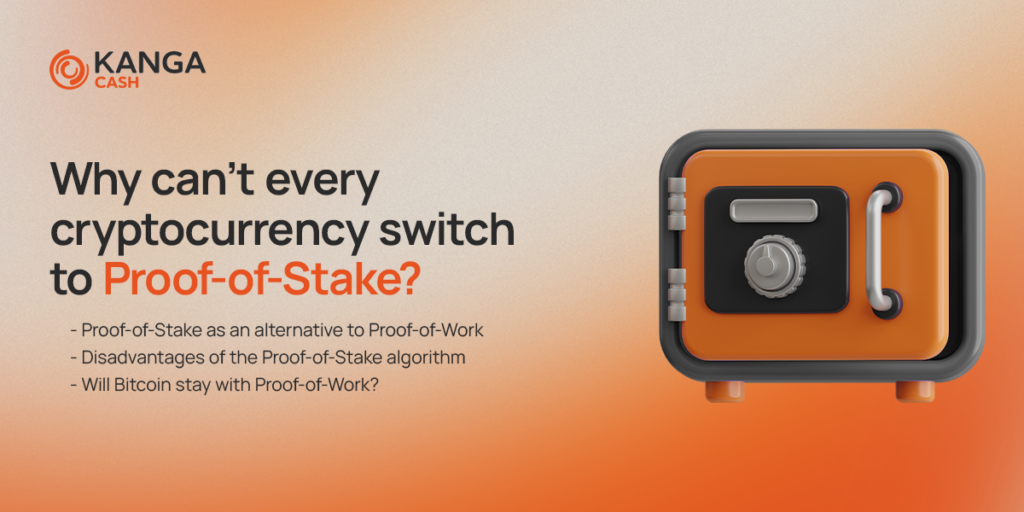Why can't every cryptocurrency switch to Proof-of-Stake?

Cryptocurrencies, since Bitcoin’s inception, have been based on the Proof-of-Work (PoW) algorithm, which is central to both the technology and the decentralized nature of cryptocurrencies. Nevertheless, with increasing environmental awareness and the need to use energy more efficiently, the Proof-of-Stake (PoS) algorithm is gaining popularity as an alternative. Despite the numerous advantages of PoS, not every cryptocurrency is able or motivated to make such a change. In this article, we will look at the factors that determine the choice between PoW and PoS and why PoS is not always a viable option.
Proof-of-Stake as an alternative to Proof-of-Work
Before understanding why some cryptocurrencies cannot migrate to PoS, it is important to understand what PoS actually is and why it is being considered as an alternative to PoW.
Proof-of-Stake is a consensus algorithm that is based on different principles than PoW. In PoW, the process of “mining” involves solving complex mathematical problems to maintain the network and add new blocks to the chain. This process is not only computationally complex, but also very energy-intensive.
In PoS, there is no mining in the traditional sense. Instead, transaction and block creation decisions are based on the coins you already have and the user’s involvement in the network. This means that people or entities who have more coins of a given cryptocurrency have a greater influence on the consensus process. PoS is greener because it does not require huge computing power or high energy consumption.
Disadvantages of the Proof-of-Stake algorithm
Even though PoS appears to be more environmentally friendly and energy efficient, there are some drawbacks that may pose barriers for cryptocurrencies considering switching to this type of consensus.
- The issue of centralization: One of the main objections to PoS is that it can lead to the centralization of power. The people or entities that hold the most coins have a greater influence on the consensus process. This creates the risk of a few wealthy investors or entities becoming dominant players, which could undermine the spirit of decentralization that is a key feature of cryptocurrencies.
- Risk of attacks: In PoS there is a risk of the so-called “51% attacks”, in which one group of users gains control of the majority of coins in the system. This poses a potential threat to network stability and integrity.
- Inequality in distribution: When a cryptocurrency has an existing distribution of coins, PoS may favor those who already hold a large amount of coins. This can make it difficult for new users to gain influence on the network.
Will Bitcoin stay with Proof-of-Work?
Bitcoin, as the first and most famous cryptocurrency, remains faithful to the PoW algorithm. There are some key reasons why Bitcoin is not going to move to PoS:
- Network security: PoW is considered more secure because its model is based on spending real resources (electricity and computer hardware) to acquire new coins. This makes attacking networks much more costly and difficult to carry out.
- History and Trust: Bitcoin has used PoW since its inception, which has helped build trust among users and investors. Switching to PoS could disrupt this stability.
- Decentralization: One of the main goals of Bitcoin is to maintain the decentralized nature of the network. PoW is considered more decentralized because it does not give an advantage to those who hold the most coins.
Technical and social constraints
In addition to the disadvantages of PoS itself, there are also other technical and social limitations that may make the transition from PoW to PoS difficult for certain cryptocurrencies:
- Technical difficulties: Implementing PoS may require significant changes to the cryptocurrency source code, which is difficult and expensive. This migration can also cause compatibility issues, making it difficult to complete.
- Social acceptance: Changing the algorithm may be met with resistance from the cryptocurrency community, especially if users and miners are opposed to the change. The decision to change the consensus must take into account the opinion of the broad user community.
- History and tradition: Some cryptocurrencies are closely related to PoW and changing the algorithm may violate their historical heritage. Users and investors may be attached to the PoW tradition and be resistant to change.
- Risk of loss of value: Switching to PoS may affect the price of cryptocurrency. Investors are afraid of changes that may affect the stability and value of their investments.
- Legal and regulatory issues: In some jurisdictions, the algorithm change may be subject to special regulations or laws, which may complicate the process of switching to PoS.
Future prospects
Despite these limitations, many cryptocurrencies continue to experiment with various consensus algorithms. PoS remains an attractive option due to its energy efficiency and lower environmental impact. However, to successfully implement PoS, projects must consider both the technical and social aspects of the change.
There are also hybrid solutions that combine PoW and PoS to take advantage of the advantages of both algorithms. This approach tries to minimize the disadvantages and at the same time increase the scalability and performance of the network.
Summary
In summary, not every cryptocurrency is ready or able to change its consensus algorithm to Proof-of-Stake. The choice between PoW and PoS depends on many factors, including the project’s goals, its history, technical capabilities and social acceptance. It cannot be clearly stated that one algorithm is better than the other, as both have their advantages and disadvantages.
Cryptocurrencies continue to evolve, and the future of consensus algorithms will depend on continued technological developments and changes in the cryptocurrency community. Regardless of which algorithm is chosen, the key goal remains to ensure network security and meet user needs.


